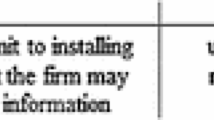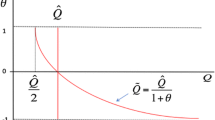Abstract
The paper considers a regulatory relationship in which the quality of the output produced by the firm may be hard to verify. When the regulator‘s commitment power is unlimited, one finds that unverifiability always hurts the regulator. Here it is shown that this need no longer be the case if the regulator‘s commitment power is limited. If unverifiability makes the regulator offer low-powered incentive schemes, the firm‘s rent from having private information about the technology is reduced. In long-term relationships, such a reduction in the information rent mitigates the ratchet effect, and by means of numerical examples it is shown that this positive effect of unverifiability may dominate the standard static cost of unverifiability.
Similar content being viewed by others
Referemces
Baker, P.B. 1992. “Incentive Contracts and Performance Measurement.” Journal of Political Economy 100:598–614.
Dalen, D.M. 1995. “Efficiency-improving Investment and The Ratchet Effect.” European Economic Review 39:1511–1522.
Freixas, X., R. Guesnerie, and J. Tirole. 1985. “Planning under Incomplete Information and the Ratchet Effect.” Review of Economic Studies 52:173–191.
Holmström, B., and P. Milgrom. 1991. “Multi-task principal agent analysis: Incentive contract, asset ownership and job design.” Journal of Law, Economics and Organization 7:26–52.
Laffont, J.J., and J. Tirole. 1987. “Comparative Statics of the Optimal Dynamic Incentive Contract.” European Economic Review 31:901–926.
Laffont, J.J., and J. Tirole. 1988. “The Dynamics of Incentive Contracts.” Econometrica 56:1153–1175.
Laffont, J.J., and J. Tirole. 1991. “Provision of quality and power of incentive schemes in regulated industries.” In Equilibrium Theory and Applications (Proceedings of the sixth International Symposium in Economic Theory and Econometrics), edited by J. Gabszewicz and A. Mas-Colell. Cambridge University Press.
Laffont, J.J., and J. Tirole. 1993. A Theory of Incentives in Procurement and Regulation. Cambridge: MIT Press.
Lewis, T.R., and D.E. M. Sappington. 1991. “Incentives for monitoring quality.” Rand Journal of Economics 22:370–384.
Martimort, D. 1994. “Multi-principal Charter as a Safeguard Against Opportunism in Organizations.” Mimeo, IDEI, Toulouse.
Olsen, T.E., and G. Torsvik. 1993. “The Ratcher Effect in Common Agency: Implications for Regulation and Privatization.” Journal of Law, Economics and Organization 9:136–158.
Olsen, T.E., and G. Torsvik. 1995. “Intertemporal common agency and organizational design: How Much decentralization?” European Economic Review 39:1405–1428.
Sappington, D.E.M. 1986. “Commitment to regulatory bureaucracy.” Information Economics and Policy 2:243–258.
Author information
Authors and Affiliations
Rights and permissions
About this article
Cite this article
Dalen, D.M. Regulation of Quality and the Ratchet Effect: Does Unverifiability Hurt the Regulator?. Journal of Regulatory Economics 11, 139–155 (1997). https://doi.org/10.1023/A:1007945915060
Issue Date:
DOI: https://doi.org/10.1023/A:1007945915060




